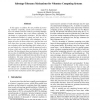Free Online Productivity Tools
i2Speak
i2Symbol
i2OCR
iTex2Img
iWeb2Print
iWeb2Shot
i2Type
iPdf2Split
iPdf2Merge
i2Bopomofo
i2Arabic
i2Style
i2Image
i2PDF
iLatex2Rtf
Sci2ools
114
click to vote
CCGRID
2001
IEEE
2001
IEEE
Sabotage-Tolerance Mechanisms for Volunteer Computing Systems
In this paper, we address the new problem of protecting volunteer computing systems from malicious volunteers who submit erroneous results by presenting sabotagetolerance mechanisms that work without depending on checksums or cryptographic techniques. We first analyze the traditional technique of voting, and show how it reduces error rates exponentially with redundancy, but requires all work to be done at least twice, and does not work well when there are many saboteurs. We then present a new technique called spot-checking which reduces the error rate linearly (i.e., inversely) with the amount of work to be done, while only costing an extra fraction of the original time. We then integrate these mechanisms by presenting the new idea of credibility-based fault-tolerance, which uses probability estimates to efficiently limit and direct the use of redundancy. By using voting and spot-checking together, credibility-based fault-tolerance effectively allows us to exponentially shrink an alre...
CCGRID 2001 | Credibility-based Fault-tolerance | Distributed And Parallel Computing | Error Rates | Linearly-reduced Error Rate |
Related Content
| Added | 23 Aug 2010 |
| Updated | 23 Aug 2010 |
| Type | Conference |
| Year | 2001 |
| Where | CCGRID |
| Authors | Luis F. G. Sarmenta |
Comments (0)

